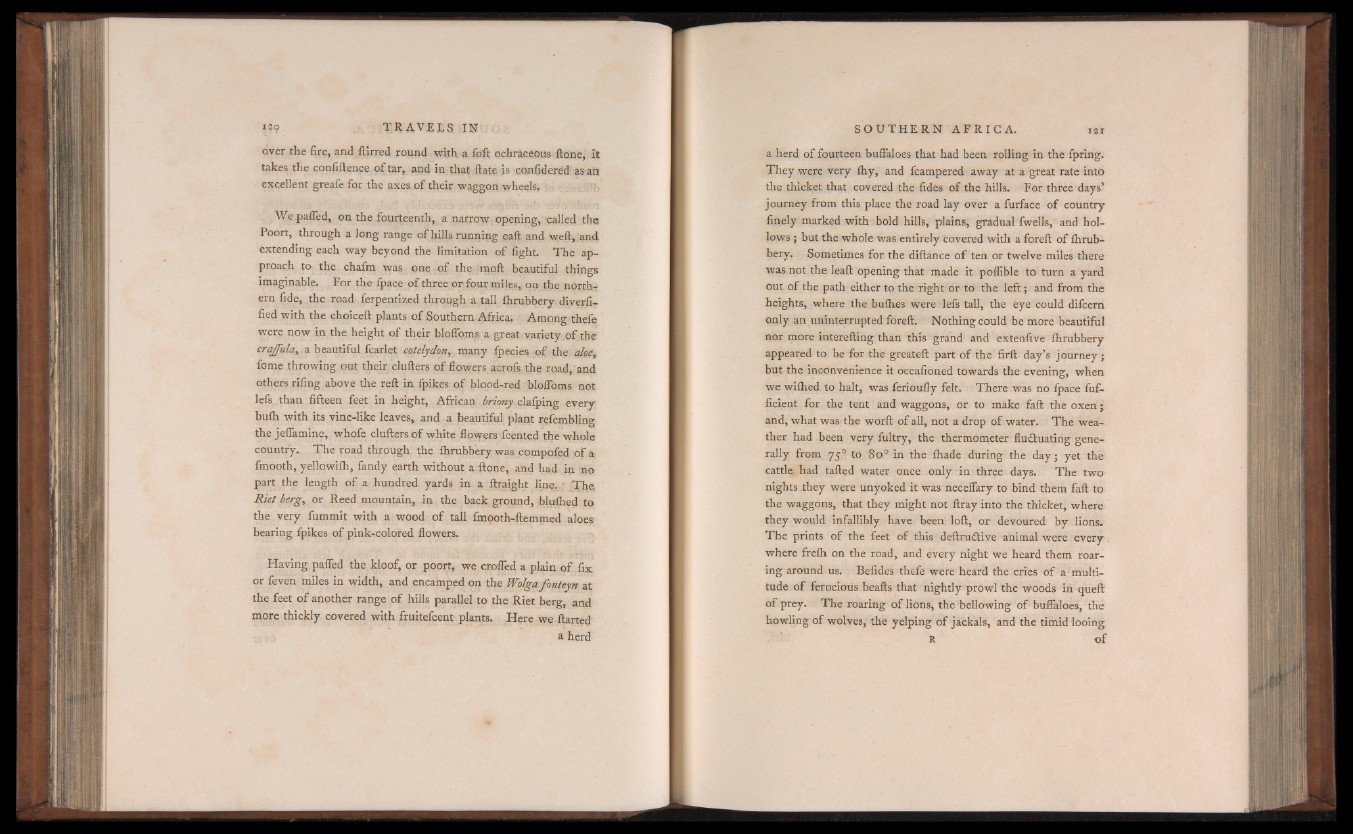
over the fire, and ftirred round with a foft ochraceous ftone, it
takes the confiftence of tar, and in that ftate is confidered as an
excellent greafe for the axes of their waggon wheels.
We palled, on the fourteenth, a narrow opening, called the
Poort, through a long range of hills running eaft and weft, and
extending each way beyond the limitation of fight. The approach
to the chafm was one o f the moil beautiful things
imaginable. For the fpace of three or four miles, on the northern
fide, the road ferpentized through a tall ihrubbery diverfi-
fied with the choiceft plants of Southern Africa. Among thefe
were now in the height of their bloffoms a great variety of the
crajjula, a beautiful fcarlet cotelydon, many fpecies of the aloe,
fome throwing out their clutters of flowers acrofs the road, and
others rifing above the reft in fpikes of blood-red bloffoms not
lefs than fifteen feet in height, African briony clafping every
bufh with its vine-like leaves, and a beautiful plant refembling
the jeffamine, whofe clufters o f white flowers fcented the whole
country. The road through the ihrubbery was compofed o f a
fmooth, yellowiih, fandy earth without a ftone, and had in no
part the length o f a hundred yards in a ftraight line, ; The
Riet berg, or Reed mountain, in the back ground, bluihed to
the very fummit with a wood o f tall fmooth-ftemmed aloes
bearing fpikes of pink-colored flowers.
Having paffed the kloof, or poort, we croffed a plain o f fix:
or feven miles in width, and encamped on the Wo/ga fonteyn at
the feet o f another range o f hills parallel to the Riet berg, and
more thickly covered with fruitefcent plants. Here we ftarted
a herd
a herd of fourteen buffaloes that had been rolling in the fpring.
They were very Ihy, and fcampered away at a great rate into
the thicket that covered the fides of the hills. For three days’
journey from this place the road lay over a furface of country
finely marked with bold hills, plains, gradual fwells, and hollows
; but the whole was entirely covered with a foreft o f ihrubbery.
Sometimes for the diftance o f ten or twelve miles there
was not the leaft opening that made it poflible to turn a yard
out of the path either to the right or to the left; and from the
heights, where the bufties were lefs tall, the eye could difcern
only an uninterrupted foreft. Nothing could be more beautiful
nor more interefting than this grand and extenfive ihrubbery
appeared to be for the greateft part of the firft day’s journey;
but the inconvenience it occafioned towards the evening, when
we wiihed to halt, was ferioufly felt. There was no ipace fuf-
ficient for the tent and waggons, or to make fail: the oxen;
and, what was the worft of all, not a drop of water. The weather
had been very fultry, the thermometer flu&uating generally
from 750 to 8o° in the ihade during the day; yet the
cattle had tailed water once only in three days. The two
nights -they were unyoked it was neceffary to bind them fail to
the waggons, that they might not ftray into the thicket, where
they would infallibly have been loft, or devoured by lions.
The prints of the feet of this deftruftive animal were every
where freih on the road, and every night we heard them roaring
around us. Befides thefe were heard the cries of a multitude
of ferocious beafts that nightly prowl the woods in queft
of prey. The roaring of lions, the bellowing of buffaloes, the
howling of wolves, the yelping o f jackals, and the timid looing
R o f